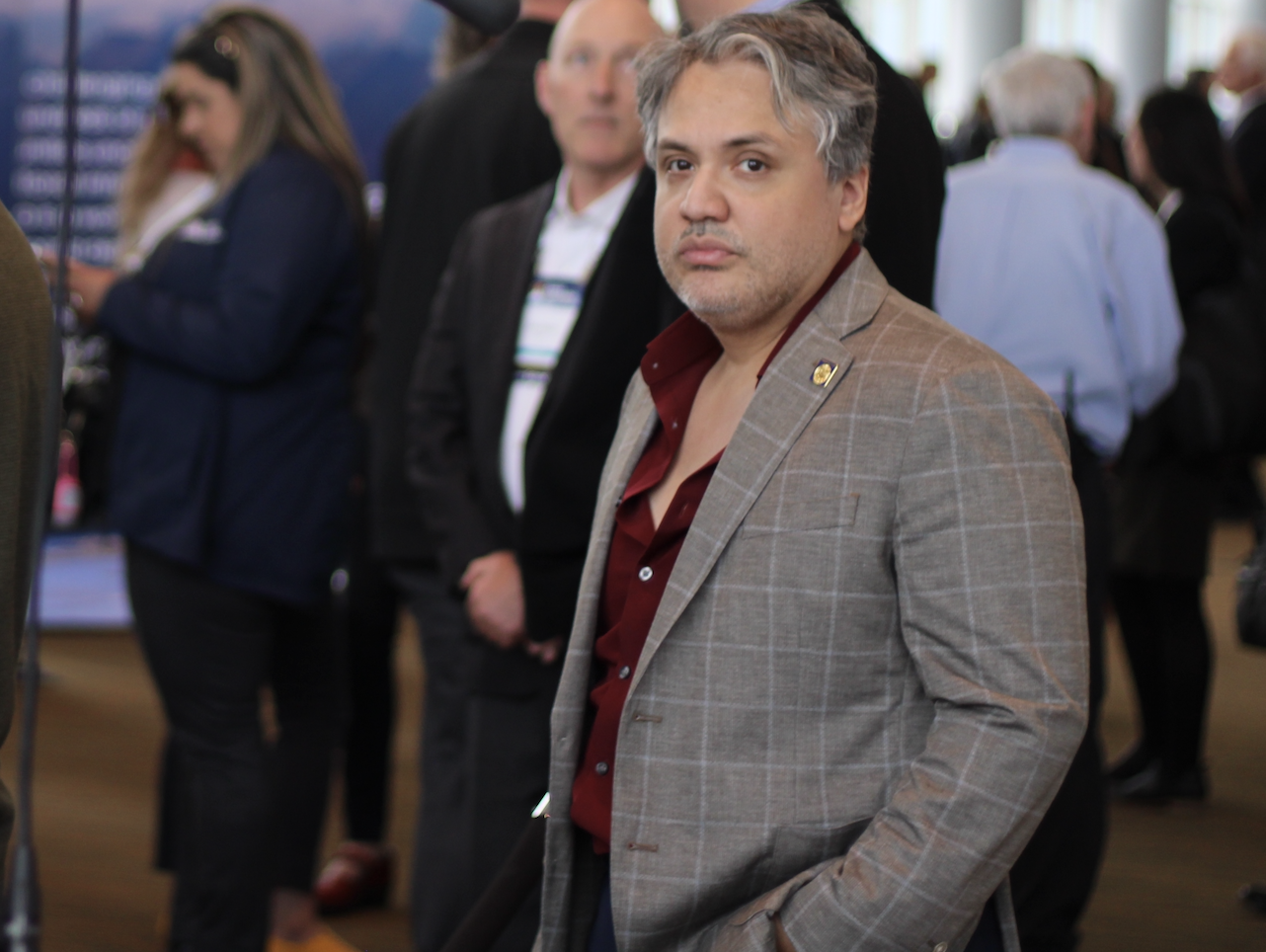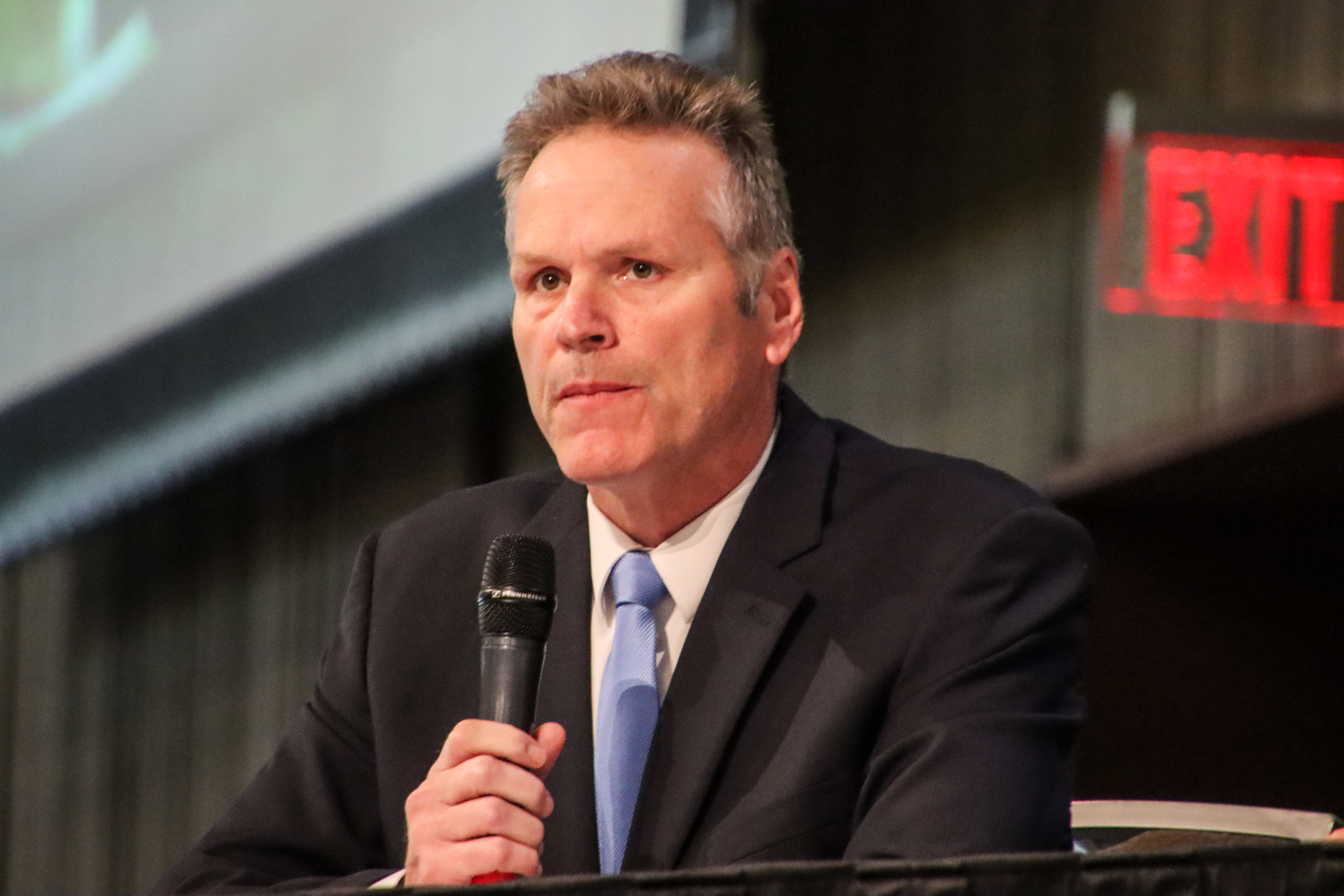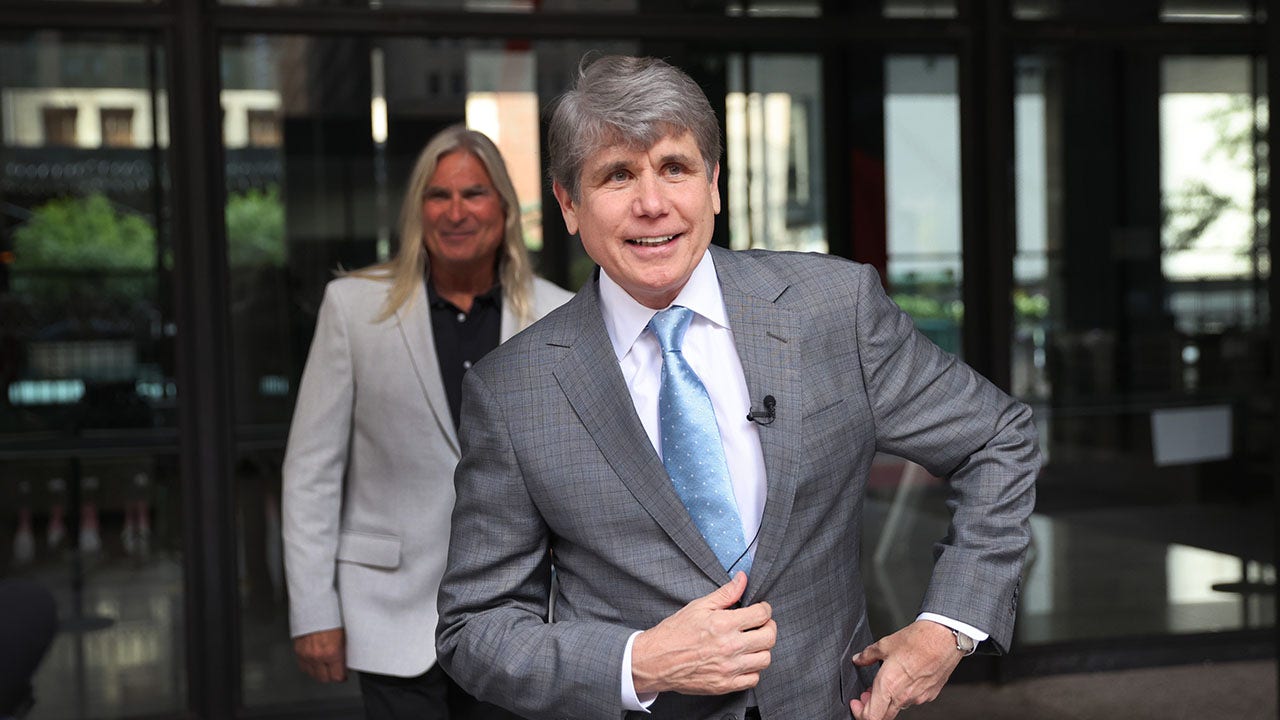Alaska
Alaska Gov. Dunleavy’s policy adviser who said ‘divorce is worse than rape’ resigns

Alaska Republican Gov. Mike Dunleavy’s adviser on “pro-family” policies resigned Tuesday after revelations that he made incendiary and offensive statements on a podcast.
A review of more than 100 hours of recordings by Alaska Public Media and APM Reports found that Jeremy Cubas defended Adolf Hitler’s views on “living homogeneously,” boasted that he uses a vile racial slur “on a daily basis” and said people should “get violent” in response to aggressive transgender activists.
He also said it’s not possible for a man to rape his wife.
“When you signed the contract, you have already consented,” Cubas said recently.
Cubas aired those and other extreme views on the podcast he co-hosts, Contra Gentiles, whose Latin title translates to “against the non-believers.”
The program, which has been published for the past three years, was available for anyone to hear on Apple Podcasts, Spotify and YouTube when Dunleavy, in April, promoted Cubas to a $110,000-a-year job as his policy adviser on “pro-family” issues.
Cubas resigned Tuesday, after Alaska Public Media and APM Reports asked Dunleavy’s office about Cubas’ comments, according to Jeff Turner, a spokesman for the governor.
“Gov. Dunleavy sincerely believes that the differences between people are what makes all of us stronger,” Turner said in a prepared statement. “The governor represents all Alaskans, regardless of their faith, ethnicity, race, sexual orientation or gender. Derogatory statements about individuals and groups within our society do not in any way reflect the values of Gov. Dunleavy or his administration and will not be tolerated.”
Cubas declined to comment after his resignation. But in a 50-minute interview Tuesday morning, he stood by his views.
“The podcast is made for people who are more philosophically inclined,” Cubas said. “So if somebody is not looking at it that way, but is just looking to get outraged, there’s nothing I can do about that.”
In an interview last month, Dunleavy said Cubas’ primary responsibility was assembling a pro-family website. He said he chose Cubas for the role because of his experience with web development, and because he’d already served as his staff photographer for more than a year.
Dunleavy and his staff have not said whether they vetted the podcast prior to Cubas’ hiring. But it appears near the top of Google’s search results for his name.
Cubas said he submitted to a background check and provided access to his social media accounts as part of the hiring process, and he assumes someone checked them.
“They didn’t really ask me specifically about things,” he said.
On his podcast, Cubas called Dunleavy a “good friend,” described traveling with the governor and told his listeners that he recently made speeches to a conservative Christian group about his new “office.”
His promotion also coincided with Dunleavy’s push to appeal to social conservatives during his second term as governor — raising questions about whether Cubas’ ideas influenced his agenda.
Juneau Democratic Sen. Jesse Kiehl, who is Jewish, was so alarmed after hearing a selection of Cubas’ comments that he immediately called Dunleavy to alert him.
“This is horrifying,” Kiehl said in an interview Monday.
“Women want to be taken by a man”
The podcast was available online for more than a year when Cubas first started working in the governor’s office in March 2022.
The name, Contra Gentiles, references a landmark religious text written in the 13th century by a Catholic priest and saint, Thomas Aquinas, and Cubas said the show draws on ideas that have been dominant in Western culture.
“I have not said anything in the podcast that has not been held for the majority of our civilization — including in the United States, at least in its early forms,” he said in the Tuesday interview.
Cubas co-hosts the program with Grant Cook, who said on the podcast that he works in a physical therapy clinic, and held jobs at a café and camera shop.
Episodes typically run about two hours, with some stretching on for more than four. The discussions are freewheeling and range from dialogue about Catholic philosophy to sophomoric banter about sex. But Cubas also shares extreme takes on social issues and sometimes expresses racist views.
APM Reports and Alaska Public Media used transcription software to analyze more than 100 episodes of the show and search for keywords. Disturbing themes quickly emerged.
In March, Cubas spoke at length about his belief that modern society has exaggerated the seriousness of rape.
“Rape, in the end, is pretty low on the totem pole of grave immoral actions,” Cubas said. “Because in the end, I mean, if you produce a child through rape, you’ve ontologically fulfilled the act to a pretty good capacity.”
Cubas said that’s why he believes that “an act like divorce is worse than rape.” While he also argued that rape can be sinful if it involves sex outside of wedlock, he said it’s fine for a man to force himself on his wife.
“I don’t think it’s possible to rape your wife. I think that that’s an impossible act,” he said. “When you signed the contract, you have already consented. You’re consenting until the end of time, until you’re dead.”
In another episode from 2021, Cubas said that “guys have been told that anything they do is rape,” and as a result have become too cautious around women. “Women,” he said, “want to be taken by a man.”
In the interview, Cubas defended his statements on rape. “This has been the view of the Western world for the majority of its history,” he said. “It’s only been in the last 80 to 100 years in which that has changed at all.”
In the discussion on rape and marriage on the podcast, Cubas also says that “sometimes a woman needs to be slapped,” and added “I don’t think there’s any sin there.”
Asked about that, Cubas maintained that he’s never slapped a woman. He said his comments on that subject referenced a 1987 interview by the late TV broadcaster Barbara Walters, in which actor Sean Connery said that slapping women is justified if “all other alternatives fail.”
Cubas’ comments directly conflict with Dunleavy’s political platform. While Cubas legitimized unwanted sex on his podcast, Dunleavy has prioritized domestic violence and sexual assault prevention during his time as governor.
In this year’s State of the State speech, Dunleavy said that ending the “scourge of sexual assault and domestic violence” is a “moral imperative.” And last month, in an executive proclamation, Dunleavy said “no one has the right to force, threaten, or manipulate anyone into sexual activity.”

Cubas defended Hitler, called MLK “a loser”
In addition to his extreme views on rape, Cubas repeatedly defended Adolf Hitler. He sometimes jokingly celebrated Hitler’s birthday, downplayed his role in the slaughter of 6 million Jews and spoke favorably about his views on keeping people of different racial backgrounds apart.
“He wasn’t just a lunatic who wanted to kill Jews. I think he was somebody who recognized the virtues of living homogeneously,” Cubas said in January — a few months before he was promoted. He added: “I think some of the principles are worth talking about.”
At the prompting of Cook, his co-host, Cubas agreed that he was not defending the Holocaust, but he argued that other Nazi leaders bore more responsibility for killing Jews than Hitler did. He also argued that Hitler accomplished much more than Martin Luther King Jr., who he called a “loser” who “accomplished nothing.”
On the same episode, Cubas argued that “anti-semitism is not a real thing,” saying that Hitler targeted Jews not because of their race but because they were “homeless people just taking over the country.”
“He wanted the races in their respective areas to remain pure, so Europe remains Europe,” Cubas added.
Cubas and Cook referenced Hitler in at least two dozen episodes, according to an analysis of the recordings. In the interview, Cubas stood by his statements about the Nazi leader.
“Many people promote the virtues of homogenous living,” he said. “I don’t see why that would be necessarily offensive, simply by virtue of Hitler approving of it.”
While Cubas frequently notes that his parents are from Peru and that his maternal grandmother was Black, he’s also called himself a “white Latino” and a “race realist.” And he invoked ugly racial stereotypes about minority groups. In several episodes Cubas also casually used the N-word.
“I say it on a daily basis,” Cubas said on an episode in 2021 where he used the racial epithet. “The more they tell me not to say it, the more I want to say it.”
In a March episode called “Satanic Gender Demons” Cubas also called for violence in response to transgender activists who are “yelling at people’s faces” and “forcing you to comply to their demands.”
“Just get violent on them,” he said. “If somebody yells at your face, there’s no reason to yell back any more. You just take your fist and you start beating them.”
Andrew Gray, the first openly gay man elected to the Alaska Legislature, said that Cubas’ comments are “absurd” and “beyond imagination.”
“If it were a movie, you wouldn’t believe it,” Gray, an Anchorage Democratic state House member, said in an interview Monday. “You would not believe that somebody working for the governor would record this in any sort of public forum — or any sort of private forum.”
Who is Jeremy Cubas?
Cubas, 40, has nine dependent children, according to a financial disclosure he filed with the state, and he owns an Anchorage photography business called MadMen Studios.
Between 2017 and 2021, he taught philosophy classes at the University of Alaska Anchorage Mat-Su campus, and he also did graduate work in philosophy at a Catholic research university in Belgium.
On his podcast, Cubas said he was raised in a Democratic household but didn’t become interested in politics until Donald Trump ran for president. He said in the interview that he was hired into his initial position in the governor’s office after applying through normal channels.
Cubas attends Wasilla’s Sacred Heart Church with Dunleavy, and his undergraduate degree came from the same Catholic university as the governor: Misericordia University, two hours north of Philadelphia.
As Dunleavy’s photographer, Cubas cut a low profile; he initially took pictures at events and helped set up audiovisual equipment for news conferences.

His promotion in April came amid Dunleavy’s renewed emphasis on social issues during his second term.
Dunleavy’s office did not announce Cubas’ promotion to the policy adviser position last month; the only public indication came through the financial disclosure that state law required Cubas to file when he was named to the higher-level job.
In an interview shortly after Cubas’ promotion, Dunleavy said Cubas’ main job duty was to set up a pro-life, pro-family web page for the state.
“All Jeremy’s doing is putting the website together. I’m the policy guy behind this approach. So, I’ll answer any questions you’ve got on that,” Dunleavy said, in response to a question about Cubas’ job description and why he was hired.
But Cubas, on his podcast, implied that his portfolio is broader than Dunleavy indicated.
In an episode earlier this month, Cubas referenced leading an “office of family life.” And he said he’d been asked to introduce “the office” at two dinners hosted by the Alaska Family Council, a prominent group promoting conservative Christian ideas.
Before Dunleavy hired him, Cubas predicted, on his podcast, that espousing controversial views like his would be career-ending.
“Try to get a professional job and walk in there and be like, ‘You know what, I think Black people are kind of genetically lazy.’ And see how long you could survive in that job,” Cubas said in 2021. “From the moment that leaves your mouth, you’re done.”
This story was produced with APM Reports as part of the Public Media Accountability Initiative, which supports investigative reporting at local media outlets around the country.
Good journalism is essential and our newsroom needs you. Donate today to keep local journalism strong.
Nathaniel Herz is an Anchorage-based journalist. He’s been a reporter in Alaska for a decade, and is currently reporting for Alaska Public Media. Find more of his work by subscribing to his newsletter, Northern Journal, at natherz.substack.com. Reach him at natherz@gmail.com.
Curtis Gilbert is an investigative reporter, producer and editor at American Public Media and Minnesota Public Radio. Reach him at cgilbert@apmreports.org.

Alaska
Alaska Senate Education Committee advances new school funding bill with $1,000 per-student boost

JUNEAU — The Alaska Senate Education Committee on Wednesday advanced an amended school funding bill with a $1,000 increase to the Base Student Allocation, the state’s per-student funding formula.
School administrators have been advocating for a $1,000 BSA boost, saying the public education system is in crisis. Districts report that hundreds of educators face being fired, popular programs are set to be cut and that school facilities are crumbling.
But many in the Legislature, including some members of the Democrat-dominated Senate majority, believe a school funding increase of that size would be unaffordable with the state facing a substantial deficit. The $1,000 BSA boost would cost roughly $250 million per year.
Last month, the House approved House Bill 69 with the same school funding increase. It contained several policy provisions intended to appeal to Gov. Mike Dunleavy who vetoed a bipartisan education package last year.
The House measure included limits on cellphones and plans to make it easier for students to attend the public school of their choice, regardless of where they live, among other policy provisions.
“We recognize that we need to have a substantial increase to school funding,” said Anchorage Democratic Sen. Löki Tobin, chair of the Senate Education Committee, at a Tuesday media conference.
A new version of House Bill 69 was unveiled Wednesday in the committee. But its total cost has not been estimated yet.
Staff for Tobin highlighted some of its new policy provisions: School districts would be required to set target class sizes and explain why they are unable to meet them; if three-quarters of a class shows improvement academically, the school can get recognition or financial benefits; and provisions were added to make it easier for charter schools to appeal denials of applications — among other changes.
“I’m generally pretty excited about it. I think it’s a good bill,” said Sitka independent Rep. Rebecca Himschoot, who was the lead sponsor behind the original version of HB 69.
The measure advanced from the Senate Education Committee on Wednesday with unanimous support. Tok Republican Sen. Mike Cronk, a minority member, was absent from Wednesday’s hearing.
At the start of the legislative session, the nonpartisan Legislative Finance Division estimated that a BSA boost of more than $1,800 would be needed to make up for losses from almost 15 years of inflation.
Since then, education advocates have been calling for the $1,000 BSA increase.
Anchorage School District began informing more than 180 educators this week that their positions will be eliminated unless the Legislature substantially raises school funding. Displaced staff would get opportunities to fill vacant positions, district officials said.
However, some Republican lawmakers have said that a school funding increase must be tied to improvements of Alaska’s bottom-of-the-nation test scores.
Lisa Parady, executive director of the Alaska Council of School Administrators, told a joint meeting of the House and Senate Education Committees on Monday that the state’s public school system needs a major investment to be made whole.
“When I hear, ‘education is failing,’ I say, ‘No, education is starving. It’s not failing. It’s starving,’ ” she said.
HB 69 heads now to the Senate Finance Committee. It remains unclear whether the $1,000 BSA boost will be approved by the full Senate.
Kodiak Republican Senate President Gary Stevens acknowledged Tuesday that his majority caucus remained split on the BSA, reflecting similar divides across the Legislature.
Lawmakers are balancing a school funding boost against this year’s Permanent Fund dividend.
“As you’re well aware, when we raise education funds, we sometimes have to lower the dividend amount,” Stevens said at a Tuesday media conference. “So that’s an issue that our caucus is dealing with, and hopefully we will come to a conclusion and be able to come to agreement with the House as well.”
In contrast, Wasilla Republican Sen. Mike Shower, the Senate minority leader, said his six-member caucus was not split on the BSA. He said by text Tuesday that the caucus could “tolerate” a $680 boost to the funding formula, which would match the same figure appropriated last year on a one-time basis.
The cost of a $680 boost to the BSA would be roughly $175 million per year.
Sitka GOP Sen. Bert Stedman, a co-chair of the Senate Finance Committee, said there was broad recognition that the current school funding formula is insufficient. He said the Legislature should approve “a minimum” of a $680 BSA boost this year, matching the school funding figure modeled in the Senate Finance Committee’s budget discussions.
Senate majority members on Tuesday spoke in favor of new revenue measures to bridge the state’s fiscal gap over the next several years.
Senators have introduced bills to raise state revenue, including by hiking oil taxes, but those measures could face long odds of being approved by the narrowly divided House.
But a $680 boost to the Base Student Allocation may not be enough for many of the state’s 53 school districts.
Clayton Holland, superintendent of the Kenai Peninsula Borough School District, told lawmakers that a school funding increase of that size would still see layoffs. The district is set to send out warning notices this week to 160 educators that their positions could be cut with a $680 increase to the BSA, he said.
Legislators have shown a renewed interest in increasing spending for school maintenance after a report by KYUK and ProPublica detailed the results of years of underfunding rural school infrastructure.
Holland, who also serves as the head of the Alaska Superintendents Association, told legislators Monday that Kenai schools have a $400 million deferred maintenance backlog. He said walls and roofs in schools across the district are crumbling.
Holland said his most “shocking story” about infrastructure failings comes from Nanwalek, a small community off the road system on the Kenai Peninsula. He said the school’s pipes are old and corroded.
“On a regular basis, my principal has to have a vacuum cleaner to suck up sewage coming out of those pipes in order to keep the school going,” he said.
One potentially contentious policy area of House Bill 69: provisions affecting homeschooled students.
The Alaska Supreme Court recently asked a lower court to determine whether it is constitutional for those students to use public funds to pay for private school tuition.
HB 69 would require greater district oversight of how homeschool allotments are used.
Additionally, House Republicans sought a funding boost for homeschooled or correspondence students, but those proposals were rejected and do not appear in the Senate’s education bill.
One new provision added to HB 69 would require homeschooled students to take state tests, alternative assessments or to produce a portfolio to receive allotments from the state. Currently, around 15% of homeschooled students take a key annual state test, which has frustrated some in the Legislature, who say the performance of correspondence students is difficult to track.
Nikiski Republican Sen. Jesse Bjorkman, a former teacher, amended the bill so that the testing requirements would only take effect in July 2026.
Alaska
Alaska Legislature OKs 18-year-olds serving alcohol in some venues

JUNEAU — The Alaska Legislature on Wednesday approved a measure that would allow 18-year-olds to serve alcohol in some venues.
The Legislature passed an almost-identical version of the bill last year. It was approved by lawmakers after the constitutional deadline for the end of the legislative session. Gov. Mike Dunleavy vetoed the bill, along with four others, arguing that they could face legal challenges.
Senate Bill 15 would allow 18- to 20-year-olds to serve alcohol under supervision in restaurants, breweries and hotels, but not bars or liquor stores. Currently, Alaskans must be 21 or older to serve alcohol in those venues.
The measure also adds a warning wherever alcohol is sold of its risks of causing cancer.
Supporters of the measure said lowering the age limit to serve alcohol would help address some of the Alaska hospitality industry’s labor challenges. Anchorage Democratic Rep. Zack Fields said the policy change would help the industry for the upcoming summer tourism season.
“For young adults who are attending college outside of Alaska, this bill increases the likelihood that they can return and work during the summer season and get really good-paying jobs,” he said before Wednesday’s final vote.
Anchorage independent Rep. Alyse Galvin supported the bill and said she worked in restaurants during college. She said being unable to serve alcohol meant she earned less money.
The House passed the measure Wednesday on a 32-8 vote. All eight no votes were by minority Republicans. They did not explain their opposition during floor debates. The Senate passed the measure unanimously in February.
Wasilla GOP Rep. Cathy Tilton voted against the measure. She said after the floor session that she supported a right to work, but she was concerned about introducing younger Alaskans to alcohol, considering the state’s high rates of addiction and abuse.
Only three U.S. states — Alaska, Utah and Nevada — require alcohol servers to be at least 21 years old.
Sarah Oates, president of the Alaska Cabaret, Hotel, Restaurant and Retailers Association, or CHARR, said that Alaska’s age limit has caused labor challenges for the hospitality industry.
“Employers struggle to promote or retain quality employees who are 18-20 years of age because they are prohibited from serving alcohol or supervising other employees who serve or sell alcohol,” she said. “Alaska is not competitive in this space, and our industry is experiencing an outmigration of young workers.”
The measure also requires new language to be added to warning signs wherever alcohol is sold. Currently, those signs say that drinking alcohol “during pregnancy can cause birth defects.”
SB 15 would require an additional warning about cancer risks, stating on signs that “alcohol use can cause cancer, including breast and colon cancers.”
Former U.S. Surgeon General Vivek Murthy in January called for cancer risk warnings to be added to alcoholic beverages. Adopting Murthy’s advisory nationally would require a measure passed by Congress.
Anchorage Democratic Rep. Andrew Gray, a physician assistant, supported adding the cancer warning signs last year. On Wednesday, Gray said he drinks alcohol, and that he isn’t trying to demonize alcohol.
“Rather, I just want Alaskans to make informed decisions about their health,” he said.
The Legislature has now approved two of five vetoed bills passed last year after the constitutional deadline for the end of the session. In February, lawmakers again approved a $75 million bonding package for a new cruise ship dock in Seward.
After Wednesday’s vote, SB 15 now advances to the governor’s desk for his consideration.
Alaska
Cheeseburgers and chicken so far fail to entice a rescue dog who's spent weeks on the run in Alaska
JUNEAU, Alaska (AP) — In the days after wildfires devastated the Los Angeles area, a formerly stray dog named Jackie lucked into a new life. She was rescued from an overburdened shelter in Los Angeles County, where she faced possible euthanasia, and given a home far away in Juneau, Alaska.
But Jackie didn’t stay long.
The German shepherd-husky mix slipped her collar on the first day with her new family in mid-February and absconded to a pocket of forest. Since then, she has been living by her wits — eluding a trap that was set with food such as cheeseburgers or chicken by animal control workers and volunteers worried about her.
The forested area Jackie frequents is near a busy road. Further, black bears are starting to reemerge from hibernation, raising the potential the dog could have an unfortunate run-in. Volunteers have stopped putting out food and cat kibble to avoid attracting bears.
“Maybe this is what she wants, is to be free and feral like this,” said Thom Young-Bayer, a Juneau animal control officer. “It’s not a safe way for her to live here.”
Young-Bayer and his wife, Skylar, have been searching in their free time, often at night, for the skittish canine, painstakingly trying to build trust with her. Jackie has been known to burrow into the soft moss on the forest floor for cover and to avoid looking directly into the Young-Bayers’ headlamps, making it hard to detect her eyes in the dark.
On videos Thom Young-Bayer has taken with his infrared camera, Jackie’s red heat signature resembles something out of the movie “Predator.”
On a recent day, Young-Bayer caught a fleeting glimpse of Jackie in the lush forest, her dark coat helping camouflage her movements among the stumps and roots. He surveyed the undergrowth and surroundings but came up empty — as did a nearby trap he had been monitoring for weeks.
When Young-Bayer returned to a trail where a fellow animal control officer had been waiting, he learned Jackie had trotted past on a frozen pond.
Lately Young-Bayer been encountering Jackie on every visit. Young-Bayer says that’s progress. Weeks ago, if Jackie saw someone, she would flee. He and his wife aren’t trying to sneak up on the dog and want to help her feel safe, he said.
Juneau Animal Rescue, a local pet adoption agency that also handles animal control and protective services, has asked that people who see Jackie report their sightings. Given the dog’s skittishness, officials want to limit those searching for her.
Little is known about Jackie’s history. She was brought into a California shelter as a stray in early January, days before deadly wildfires swept through the Los Angeles area. She is believed to be 2 to 3 years old. Her intake forms listed her as quiet with a moderate anxiety and stress level.
Skylar Young-Bayer, who has volunteered with rescue groups in that region, helped arrange for Jackie and two other dogs at risk of being euthanized to be transferred to Juneau for adoption. Jackie was with a foster home before her adoption placing.
Other dogs have gained fame as fugitives, including Scrim, a 17-pound, mostly terrier mutt who was recaptured in New Orleans in February — in a cat trap — after months on the lam.
Mike Mazouch, animal control and protection director for Juneau Animal Rescue, noted Jackie didn’t have much time to bond with her new family before bolting. Officers deemed trying to tranquilize her as too risky because they didn’t know if they would be able to find her once she was sedated.
Mazouch accompanied Thom Young-Bayer to the forest last week to disassemble the trap when Jackie came within 50 feet (15 meters) of Mazouch on the frozen pond. Mazouch snapped a photo of her as she appeared between the skinny, tall trees. He called efforts to capture her a “battle of wills.”
“She is not willing to give up, and we’re not willing to give up, either,” Mazouch said.
-

 News1 week ago
News1 week agoTrump Is Trying to Gain More Power Over Elections. Is His Effort Legal?
-

 News1 week ago
News1 week agoWashington Bends to RFK Jr.’s ‘MAHA’ Agenda on Measles, Baby Formula and French Fries
-

 News1 week ago
News1 week agoCompanies Pull Back From Pride Events as Trump Targets D.E.I.
-

 World1 week ago
World1 week agoAt least six people killed in Israeli attacks on southern Syria
-

 Technology1 week ago
Technology1 week agoTrump officials planned a military strike over Signal – with a magazine editor on the line
-

 Technology1 week ago
Technology1 week agoThe FBI launched a task force to investigate Tesla attacks
-

 World1 week ago
World1 week agoNo, Norway and Sweden haven't banned digital transactions
-

 Culture1 week ago
Culture1 week agoAnalysing Jamal Musiala’s bizarre corner goal for Germany against Italy















